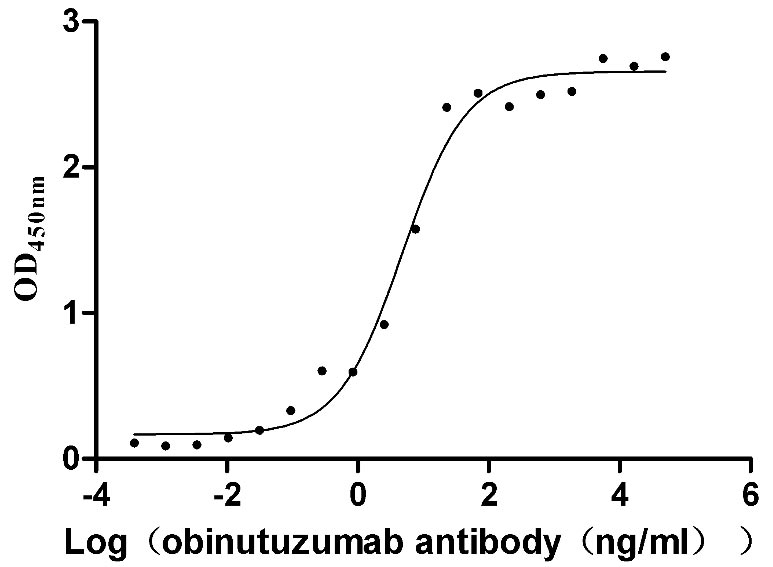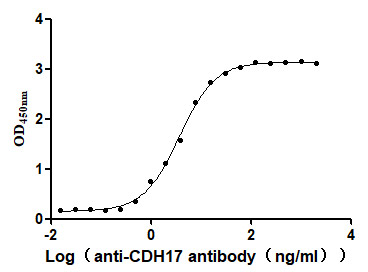Recombinant Bacillus subtilis Sporulation kinase A (kinA), partial
-
中文名稱:枯草芽孢桿菌kinA重組蛋白
-
貨號(hào):CSB-YP324544BRJ
-
規(guī)格:
-
來源:Yeast
-
其他:
-
中文名稱:枯草芽孢桿菌kinA重組蛋白
-
貨號(hào):CSB-EP324544BRJ
-
規(guī)格:
-
來源:E.coli
-
其他:
-
中文名稱:枯草芽孢桿菌kinA重組蛋白
-
貨號(hào):CSB-EP324544BRJ-B
-
規(guī)格:
-
來源:E.coli
-
共軛:Avi-tag Biotinylated
E. coli biotin ligase (BirA) is highly specific in covalently attaching biotin to the 15 amino acid AviTag peptide. This recombinant protein was biotinylated in vivo by AviTag-BirA technology, which method is BriA catalyzes amide linkage between the biotin and the specific lysine of the AviTag.
-
其他:
-
中文名稱:枯草芽孢桿菌kinA重組蛋白
-
貨號(hào):CSB-BP324544BRJ
-
規(guī)格:
-
來源:Baculovirus
-
其他:
-
中文名稱:枯草芽孢桿菌kinA重組蛋白
-
貨號(hào):CSB-MP324544BRJ
-
規(guī)格:
-
來源:Mammalian cell
-
其他:
產(chǎn)品詳情
-
純度:>85% (SDS-PAGE)
-
基因名:kinA
-
Uniprot No.:
-
別名:kinA; gsiC; scoD; spoIIF; spoIIJ; BSU13990; Sporulation kinase A; EC 2.7.13.3; Stage II sporulation protein F; Stage II sporulation protein J
-
種屬:Bacillus subtilis (strain 168)
-
蛋白長(zhǎng)度:Partial
-
蛋白標(biāo)簽:Tag?type?will?be?determined?during?the?manufacturing?process.
The tag type will be determined during production process. If you have specified tag type, please tell us and we will develop the specified tag preferentially. -
產(chǎn)品提供形式:Lyophilized powder
Note: We will preferentially ship the format that we have in stock, however, if you have any special requirement for the format, please remark your requirement when placing the order, we will prepare according to your demand. -
復(fù)溶:We recommend that this vial be briefly centrifuged prior to opening to bring the contents to the bottom. Please reconstitute protein in deionized sterile water to a concentration of 0.1-1.0 mg/mL.We recommend to add 5-50% of glycerol (final concentration) and aliquot for long-term storage at -20℃/-80℃. Our default final concentration of glycerol is 50%. Customers could use it as reference.
-
儲(chǔ)存條件:Store at -20°C/-80°C upon receipt, aliquoting is necessary for mutiple use. Avoid repeated freeze-thaw cycles.
-
保質(zhì)期:The shelf life is related to many factors, storage state, buffer ingredients, storage temperature and the stability of the protein itself.
Generally, the shelf life of liquid form is 6 months at -20°C/-80°C. The shelf life of lyophilized form is 12 months at -20°C/-80°C. -
貨期:Delivery time may differ from different purchasing way or location, please kindly consult your local distributors for specific delivery time.Note: All of our proteins are default shipped with normal blue ice packs, if you request to ship with dry ice, please communicate with us in advance and extra fees will be charged.
-
注意事項(xiàng):Repeated freezing and thawing is not recommended. Store working aliquots at 4°C for up to one week.
-
Datasheet :Please contact us to get it.
靶點(diǎn)詳情
-
功能:Phosphorylates the sporulation-regulatory proteins spo0A and spo0F. It also autophosphorylates in the presence of ATP.
-
基因功能參考文獻(xiàn):
- These data indicated that the autokinase activity is dependent on the formation of a functional tetramer, which is mediated by, at least, the PAS-B and PAS-C domains. PMID: 28449380
- autophosphorylation of the major sporulation histidine kinase KinA is able to occur in trans within the homotetramer complex PMID: 26055117
- Findings suggest that dimerization of PAS(B) is important for keeping the catalytic domain of KinA in a functional conformation. We use this information to propose a model for the structure of the N-terminal sensor module of KinA. PMID: 23504013
- Tetramer formation mediated by the N-terminal domain of kinA is important for the kinase activity catalyzed by the C-terminal domain. PMID: 21926229
- Sda slows the rate of phosphotransfer from KinA to its target, Spo0F. PMID: 19040634
顯示更多
收起更多
-
數(shù)據(jù)庫鏈接:
KEGG: bsu:BSU13990
STRING: 224308.Bsubs1_010100007766
Most popular with customers
-
Recombinant Human B-lymphocyte antigen CD20 (MS4A1)-VLPs (Active)
Express system: Mammalian cell
Species: Homo sapiens (Human)
-
Recombinant Human Cadherin-17 (CDH17), partial (Active)
Express system: Mammalian cell
Species: Homo sapiens (Human)













